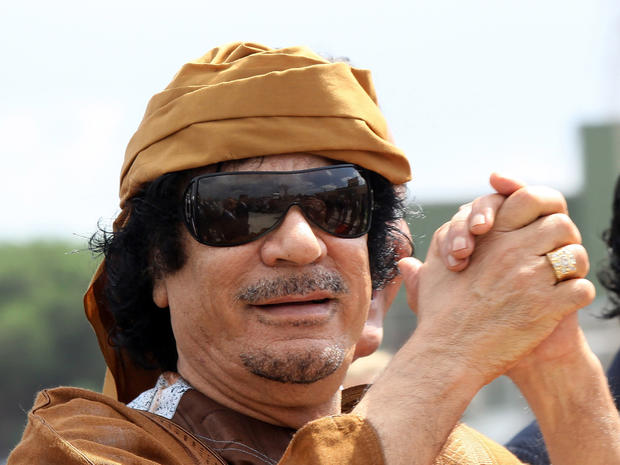Global arrest warrant issued for Qaddafi, son
The International Criminal Court on Monday issued arrest warrants for Libyan leader Muammar al Qaddafi, his son Saif al Islam Qaddafi - whom the court dubbed Libya's "de-facto" prime minister, and Libya's head of intelligence, Abdullah Al-Senussi, who is Qaddafi's brother-in-law, for war crimes and crimes against humanity.
The warrants name Qaddafi for the commission of two categories of crimes against humanity: Murder under Article 7(1)(a) of the Rome Statute, and persecution of crimes against humanity under Article 7(1)(h) of the Rome Statute.
The court's move comes on the 101st day of aerial bombardment by NATO warplanes and helicopters of "command and control" sites belonging to Qaddafi's regime - a limited military campaign which has enabled the nation's rebel movement to hold their ground, but advance very little on the regime's strongholds.
Special section: Anger in the Arab world
The ruling was made by three pre-trial Judges based on a lengthy request by the court's chief prosecutor, Luis Moreno-Ocampo, submitted to the Court in mid-May.
Moreno-Ocampo's office responded to Monday's ruling by calling on anyone and everyone to try and deliver Qaddafi to justice.
"Today ICC judges decided after evaluating the evidence that Muammar Qaddafi, his son Saif Al-Islam Qaddafi and Abdulla Al-Senussi are responsible for crimes allegedly committed in Libya," the prosecutor's office said in a written statement. "To prevent them covering up ongoing crimes and committing new crimes, they should be arrested. This is the only way to protect civilians in Libya."The I.C.C. does not have enforcement power, but the court, based in The Hague, Netherlands, has already requested that Libyan authorities arrest those who are indicted, even though Libya is not a signatory of the Rome Statute, which establishes the Court's jurisdiction.
Or, if Qaddafi travels to any of the 116 nations which are members of the Court, including the latest nation, Libya's neighbor, Tunisia (which last week sent in its documents of accession, and whose membership will take effect in September) they are obliged, under the statute, to arrest him and turn him over to the court.
This will put Qaddafi's allies in Uganda or Venezuela - both members of the Court - in a difficult position if he decides to seek refuge. The court can also ask non-state parties to arrest him.
The White House, its NATO allies, or the United Nations may try to persuade Qaddafi's own forces, rebels, or another nation to deliver Qaddafi to The Hague for trial.
Earlier this month in the report to the United Nations Security Council obtained by CBS News, Moreno-Ocampo said there was evidence in a newly-created crime database which shows systematic "shooting at peaceful protesters" by Qaddafi's security forces.
That report said there was relevant information concerning the use of rape as a weapon, deportation and war crimes against civilians not taking a direct part in the fighting with government forces:
"Dead bodies were removed from streets and hospitals. Doctors were not allowed to document the number of dead and injured admitted to hospitals after the violent clashes began," wrote Moreno-Ocampo. "Security forces were allegedly stationed in the hospitals and arrested injured protesters who sought medical treatment. Victims of rape have reportedly been arrested and subject to harassment."
The U.N. Security Council voted in February to refer the Libyan crisis to the International Criminal Court, and the prosecutor launched a formal investigation days later.
But since no trials have been completed in the court's 10-year existence, there is not a lot of track record to know how a trial would actually be handled. When the Security Council referred the case of Libya, it did so because of, "the need to hold to account those responsible for attacks, including by forces under their control, on civilians."
In April, Moreno-Ocampo told CBS News in an exclusive interview that, "after the crimes of the Holocaust, we cannot accept massive atrocities. No state can attack massively its own citizens."
The prosecutor is expected to hold a news conference on Tuesday to discuss the court's ruling and to reiterate his plea to the international community - including the U.S., which isn't even a signatory to the court - to help bring Qaddafi to justice.
Qaddafi continues to fight, NATO continues its efforts to protect civilians, and what happens next is not clear. Heads of state including President Obama, British Prime Minister David Cameron, French President Nicolas Sarkozy and Turkish Prime Minister Recep Tayip Erdogan have called on Qaddafi to resign.
Monday, Qaddafi remains a "wanted man" as far as international justice is concerned, and his options for a political settlement and safe exile have just diminished dramatically.

